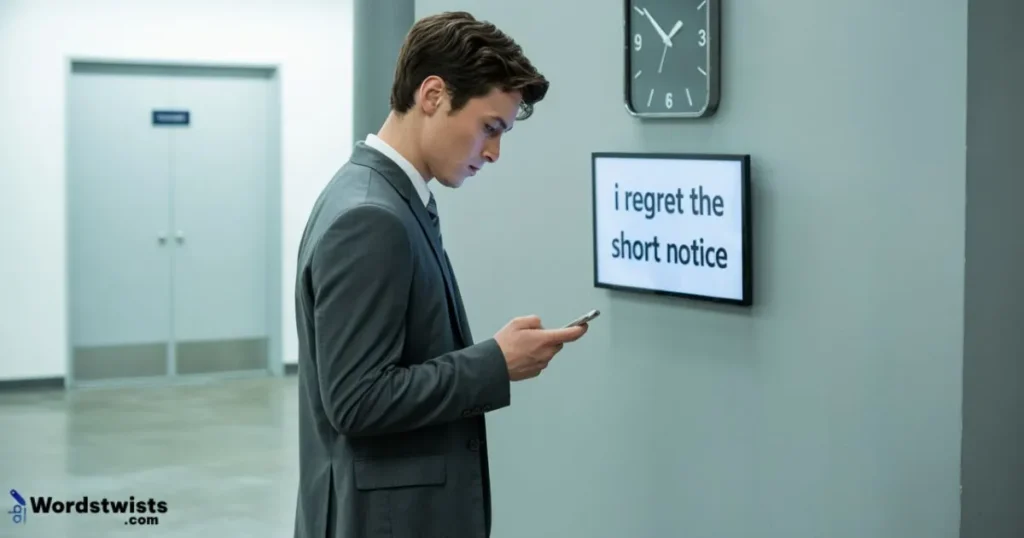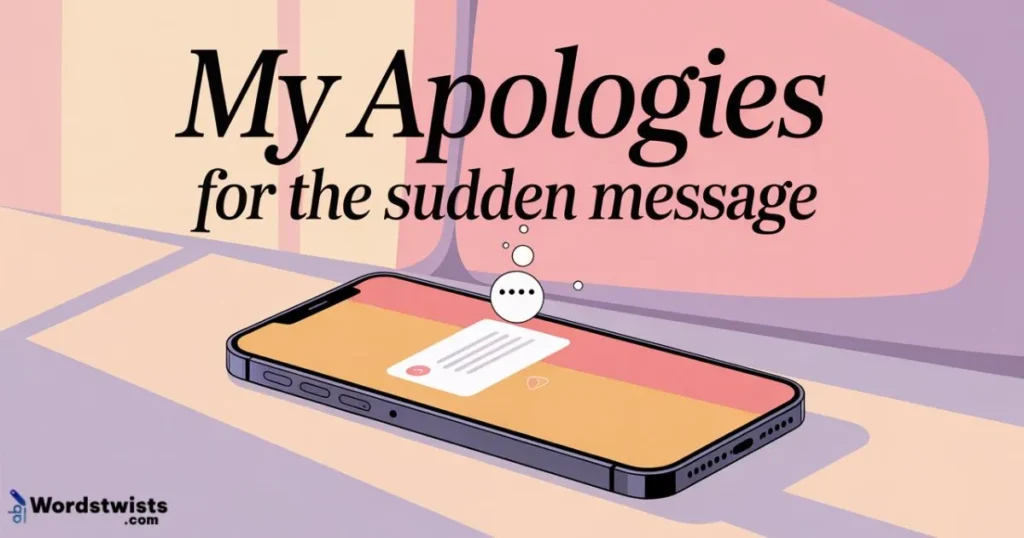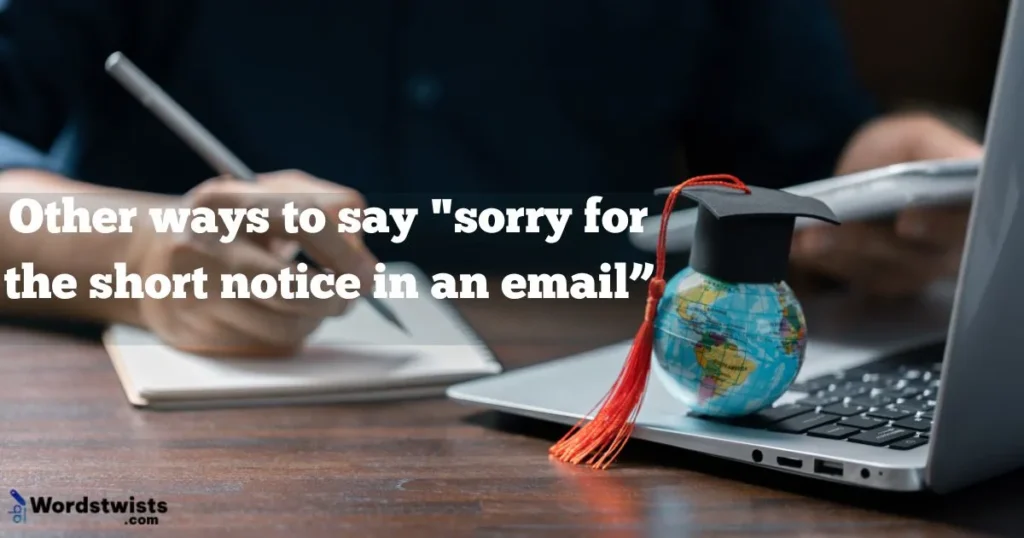Apologies for the Last-Minute Request!
We’ve all been in that situation needing to send an email at the last minute, and the inevitable phrase “sorry for the short notice” pops up. While it’s a perfectly acceptable phrase, using it repeatedly can make your communication feel predictable and stale. Whether you’re apologizing for an impromptu request, informing someone about an unexpected change, or notifying them of a sudden deadline, it’s important to find more creative ways to express this sentiment.
In this post, we’re diving into 25 alternative ways to say “sorry for the short notice” that will give your emails a fresh twist. These alternatives are perfect for making your communication sound more professional, polite, and thoughtful. They will help you apologize for any sudden changes with style, precision, and a personal touch. Ready to ditch the same old phrasing? Let’s explore these alternatives together!
Alternative ways to say sorry for the short notice in an email
1. Apologies for the late notice
Explanation: This phrase is a straightforward way to acknowledge that your communication came later than expected.
Usage examples:
- Apologies for the late notice, but I need to reschedule our meeting.
- Apologies for the late notice, I’ve just received the update.
- Apologies for the late notice; I understand this may cause inconvenience.
- I apologize for the late notice, but can we have the report by tomorrow?
- Apologies for the late notice, I appreciate your understanding.
Why it works: The phrase directly addresses the timing of the message and is still polite, without being overly formal.
2. Sorry for the delay in informing you
Explanation: This alternative focuses on the delay in providing information, a more specific form of apology.
Usage examples:
- Sorry for the delay in informing you, but the details just came through.
- Sorry for the delay in informing you about the change of venue.
- I’m sorry for the delay in informing you, I just got back to the office.
- Sorry for the delay in informing you, I had to confirm a few things.
- I apologize for the delay in informing you; we’ve had some changes to the schedule.
Why it works: This phrase specifically acknowledges the delay in sharing information, making it more tailored to the situation.
3. I hope it’s not too much trouble
Explanation: This expression shows concern for the inconvenience caused by the last-minute request, softening the apology.
Usage examples:
- I hope it’s not too much trouble, but could you prepare the document for me?
- I hope it’s not too much trouble, but I need to change our meeting time.
- I hope it’s not too much trouble, but could you let me know your availability?
- I hope it’s not too much trouble, but the client has requested a change in the delivery date.
- I hope it’s not too much trouble, but could you handle this urgent matter?
Why it works: This approach conveys politeness while considering the potential inconvenience the recipient might face.
4. I regret the short notice

Explanation: A slightly more formal option, this phrase expresses regret about the timing of the communication.
Usage examples:
- I regret the short notice, but there has been a sudden change in plans.
- I regret the short notice; please let me know if this timing works for you.
- I regret the short notice; I understand if this is difficult for you to accommodate.
- I regret the short notice, and I apologize for the inconvenience.
- I regret the short notice, but I assure you this will be resolved quickly.
Why it works: It communicates a sense of genuine regret, which can make the apology sound more sincere and empathetic.
5. Apologies for the late update
Explanation: This phrase highlights that the information being provided is coming at a later time than expected.
Usage examples:
- Apologies for the late update, but I just got the confirmation.
- Apologies for the late update on the project status.
- I’m sorry for the late update, I had to finalize some details.
- Apologies for the late update regarding the event schedule.
- Apologies for the late update, I appreciate your patience.
Why it works: This phrase is particularly useful when you’re updating someone on something that was delayed, offering a polite explanation.
Other Ways to Say Proud of You with Heart
6. I apologize for the last-minute change
Explanation: This phrase works well when referring to a sudden alteration to plans or a schedule.
Usage examples:
- I apologize for the last-minute change in our meeting time.
- I apologize for the last-minute change in the agenda.
- I apologize for the last-minute change; I understand if it’s inconvenient.
- I apologize for the last-minute change to the presentation schedule.
- I apologize for the last-minute change, but I’m confident we’ll manage.
Why it works: It clearly communicates that the change was unexpected and acknowledges any potential inconvenience.
7. I hope this isn’t too sudden
Explanation: This phrase gently apologizes for any surprise or urgency caused by the request.
Usage examples:
- I hope this isn’t too sudden, but could you send me the document by noon?
- I hope this isn’t too sudden, but there’s a change in the meeting time.
- I hope this isn’t too sudden, but I need your confirmation on this matter.
- I hope this isn’t too sudden, but could we reschedule our appointment?
- I hope this isn’t too sudden, but I’ve just received new information.
Why it works: This phrase is soft and apologetic, offering a polite tone while acknowledging the unexpected nature of the request.
8. Sorry for the abrupt notice
Explanation: This is a casual yet sincere way to acknowledge that the message came out of the blue.
Usage examples:
- Sorry for the abrupt notice, but the meeting has been moved up.
- Sorry for the abrupt notice; I just received the final word.
- Sorry for the abrupt notice, I’ll follow up with details shortly.
- Sorry for the abrupt notice, we’ll make sure it doesn’t happen again.
- Sorry for the abrupt notice, and thank you for your flexibility.
Why it works: It emphasizes the unexpected nature of the message while still sounding professional and courteous.
9. I know this is short notice
Explanation: This shows direct acknowledgment of the timing and adds a human touch.
Usage examples:
- I know this is short notice, but could you help me with this task?
- I know this is short notice, and I appreciate your support.
- I know this is short notice, but there’s been a change in plans.
- I know this is short notice, thank you for understanding.
- I know this is short notice, and I wouldn’t ask if it weren’t important.
Why it works: It’s conversational, relatable, and shows awareness without sounding overly apologetic.
10. I realize this is very last-minute
Explanation: This phrase is direct and takes full responsibility for the timing, often used when urgency is involved.
Usage examples:
- I realize this is very last-minute, but we need to finalize the document.
- I realize this is very last-minute, but could you attend the call?
- I realize this is very last-minute, and I truly appreciate your help.
- I realize this is very last-minute, but things shifted quickly.
- I realize this is very last-minute, so feel free to let me know if it’s not feasible.
Why it works: It takes accountability and conveys urgency with empathy, which is effective in building trust.
Other Ways to Say Happy Friday with Style
11. Thank you for bearing with the late notice
Explanation: This phrase blends appreciation and acknowledgment of the situation, showing thoughtfulness.
Usage examples:
- Thank you for bearing with the late notice, I truly appreciate it.
- Thank you for bearing with the late notice, the venue just changed.
- Thank you for bearing with the late notice, I owe you one.
- Thank you for bearing with the late notice, and I’ll make it up to you.
- Thank you for bearing with the late notice, the update came in late.
Why it works: It adds a grateful tone that can ease tension and strengthen professional rapport.
12. My apologies for the sudden message

Explanation: A polite and formal way to show regret over abrupt communication.
Usage examples:
- My apologies for the sudden message, I just got the directive.
- My apologies for the sudden message, and thank you for your time.
- My apologies for the sudden message, but your input is urgently needed.
- My apologies for the sudden message, I understand this may be disruptive.
- My apologies for the sudden message; I appreciate your prompt attention.
Why it works: This phrasing is respectful and works especially well in professional or corporate emails.
13. I truly appreciate your flexibility on this
Explanation: Instead of focusing on the lateness, this highlights appreciation for the recipient’s willingness to adapt.
Usage examples:
- I truly appreciate your flexibility on this last-minute request.
- I truly appreciate your flexibility on the new timeline.
- I truly appreciate your flexibility on the venue change.
- I truly appreciate your flexibility on shifting the schedule.
- I truly appreciate your flexibility on helping out at short notice.
Why it works: It creates a positive and thankful tone, which strengthens goodwill in professional communication.
14. Thank you for adjusting on short notice
Explanation: A grateful tone that gently acknowledges the situation without over-apologizing.
Usage examples:
- Thank you for adjusting on short notice, we really needed the help.
- Thank you for adjusting on short notice, I know it’s not ideal.
- Thank you for adjusting on short notice, you’re a lifesaver.
- Thank you for adjusting on short notice, I’ll owe you one.
- Thank you for adjusting on short notice, and everything went smoothly thanks to you.
Why it works: It highlights gratitude and keeps the focus on the recipient’s helpfulness, not the problem.
15. Thanks for your patience with the sudden update
Explanation: Ideal when you’ve made a change and want to appreciate the recipient’s calmness and understanding.
Usage examples:
- Thanks for your patience with the sudden update, I know it was unexpected.
- Thanks for your patience with the sudden update, we had to act fast.
- Thanks for your patience with the sudden update, we’ll keep you informed going forward.
- Thanks for your patience with the sudden update; things moved quickly.
- Thanks for your patience with the sudden update, I appreciate your support.
Why it works: This phrase acknowledges the shift while making the recipient feel valued and respected.
Other Ways to Say Sounds Good Professionally
16. I hope this timing still works for you
Explanation: This is a polite and considerate way to acknowledge that your request or update may be sudden.
Usage examples:
- I hope this timing still works for you despite the short notice.
- I hope this timing still works for you, let me know if not.
- I hope this timing still works for you—apologies for the quick ask.
- I hope this timing still works for you; your presence would mean a lot.
- I hope this timing still works for you, and I appreciate your understanding.
Why it works: It softens the tone and focuses on flexibility, making the message more thoughtful and kind.
17. Apologies for the rushed message
Explanation: This shows you’re aware of how sudden your email might seem and still keeps it professional.
Usage examples:
- Apologies for the rushed message, but we need your approval quickly.
- Apologies for the rushed message, I just received the update.
- Apologies for the rushed message, your input is urgently needed.
- Apologies for the rushed message, I know this may be inconvenient.
- Apologies for the rushed message, I’ll follow up with more details soon.
Why it works: It’s brief but polite and shows you’re aware of the urgency without sounding careless.
18. I wish I had more time to give you notice
Explanation: This is a warm and honest way to express regret for not informing earlier.
Usage examples:
- I wish I had more time to give you notice, but this just came up.
- I wish I had more time to give you notice, thank you for your help.
- I wish I had more time to give you notice, it wasn’t ideal timing.
- I wish I had more time to give you notice, and I truly appreciate your flexibility.
- I wish I had more time to give you notice, but this was urgent.
Why it works: It sounds human and sincere, showing that the timing wasn’t in your control.
19. Thanks for stepping in at the last minute
Explanation: This phrase gives instant appreciation to someone who helped despite short notice.
Usage examples:
- Thanks for stepping in at the last minute, you really saved the day.
- Thanks for stepping in at the last minute, I owe you one.
- Thanks for stepping in at the last minute, I truly appreciate it.
- Thanks for stepping in at the last minute, it made a big difference.
- Thanks for stepping in at the last minute, I’ll return the favor soon.
Why it works: It puts the focus on gratitude instead of the timing, making your message sound positive and grateful.
Other Ways to Say This Quote Shows Meaning Clearly
20. Please bear with the short notice
Explanation: This shows humility and politely asks for patience from the reader.
Usage examples:
- Please bear with the short notice, and thank you for understanding.
- Please bear with the short notice—we’re working quickly.
- Please bear with the short notice, this was unexpected.
- Please bear with the short notice, and I’ll make it up to you.
- Please bear with the short notice, and thank you for your time.
Why it works: It’s respectful, easy to understand, and shows a calm, professional tone.
21. I know this is coming out of the blue
Explanation: A casual and friendly way to admit your email might feel unexpected.
Usage examples:
- I know this is coming out of the blue, but can we reschedule?
- I know this is coming out of the blue, thank you for your help.
- I know this is coming out of the blue, but it’s urgent.
- I know this is coming out of the blue, I hope it’s okay.
- I know this is coming out of the blue, thanks for your quick reply.
Why it works: It feels natural and relatable while still being respectful and clear.
22. I understand this is last-minute
Explanation: This shows empathy and consideration for the reader’s schedule.
Usage examples:
- I understand this is last-minute, and I truly appreciate your time.
- I understand this is last-minute, but we’re on a tight timeline.
- I understand this is last-minute, thank you for making it work.
- I understand this is last-minute, I’ll keep you posted going forward.
- I understand this is last-minute, I’m grateful for your flexibility.
Why it works: It balances being honest and polite, which makes it very effective for emails.
23. Hope this doesn’t catch you off guard
Explanation: This soft phrase acknowledges that your message may feel sudden, in a friendly tone.
Usage examples:
- Hope this doesn’t catch you off guard, but we need to move fast.
- Hope this doesn’t catch you off guard—thank you for your help.
- Hope this doesn’t catch you off guard, just got the update myself.
- Hope this doesn’t catch you off guard, your input is key.
- Hope this doesn’t catch you off guard, I’ll explain more in the meeting.
Why it works: It’s conversational and shows care for how your message might affect the reader.
24. Appreciate your understanding despite the timing
Explanation: This puts the focus on appreciation and gives a professional yet warm tone.
Usage examples:
- Appreciate your understanding despite the timing of this request.
- Appreciate your understanding despite the timing—we’re working fast.
- Appreciate your understanding despite the timing, we had no choice.
- Appreciate your understanding despite the timing, I’ll clarify everything shortly.
- Appreciate your understanding despite the timing, it means a lot.
Why it works: It sounds respectful, humble, and mature—perfect for both formal and semi-formal emails.
25. Apologies for not giving you more notice
Explanation: This is a clear and sincere way to accept responsibility in a kind tone.
Usage examples:
- Apologies for not giving you more notice, and thank you for being flexible.
- Apologies for not giving you more notice, it came up fast.
- Apologies for not giving you more notice, I’ll follow up soon.
- Apologies for not giving you more notice, I know it’s not ideal.
- Apologies for not giving you more notice, and thanks again.
Why it works: It’s straightforward and respectful, making it a reliable option in professional settings.
Conclusion
Choosing the right words in your email communication can really shape how your message is received. When you use alternatives to saying “Sorry for the short notice”, you don’t just sound polite—you also come across as more thoughtful, genuine, and professional. These 25 alternatives help you express respect, gratitude, and awareness of the situation, while keeping the tone positive and human.
Try adding a few of these into your emails—you’ll notice how your conversations become more engaging and appreciated. If you found this helpful, feel free to save or share this guide for future use! Want more email phrase alternatives? Let me know, and I’d be glad to help.

I’m Leo Knox, the wordplay wizard behind WordsTwists.com where I turn everyday meanings into funny, clever, and creative twists. If you’re tired of saying things the boring way, I’ve got a better (and funnier) one for you!


